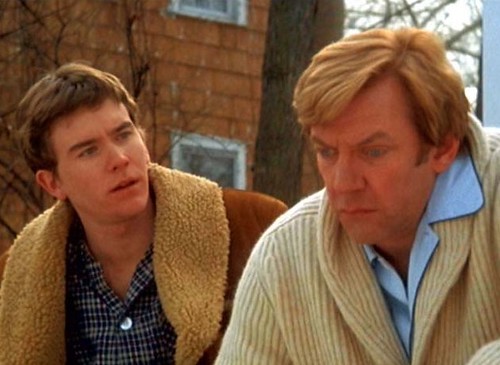
The moving film 'Ordinary People' details a family recovering from one son's accidental death and another son's failed suicide attempt. Conrad Jarrett (Timothy Hutton) is the teenage son, dealing with post-traumatic stress; he almost died along with his brother, whom he watched drown, and memories of his near suicide hang over him. Beth (Mary Tyler Moore), his mother, plays the perfect housewife, beautiful, active, charming, and all too practical. Calvin (Donald Sutherland), the compassionate father, is caught between his fragile son and brittle wife. We follow the parents, as they receive unhelpful advice from friends and colleagues, and Conrad, as he attempts to readjust to school life after returning from a psychiatric hospital. A psychiatrist, Dr. Berger (Judd Hirsch), causes Conrad to confront his feelings.
Robert Redford emphasizes the pristine homes of affluent families and their amusingly mundane small talk, masking the deeper issues in these individuals' lives. The dialogue is funny, introspective, and believable. Because of the presence of a psychiatrist and a focus on intense emotional upheaval, characters delve deep into feelings. Sometimes the theories and speeches come across as dated and affected; symbols and realizations are at times overdone. Still, the film holds up remarkably well after thirty years.
The acting is all around excellent. Hutton is lovely as the awkward Conrad, internally tumultuous and outwardly tense. As the genial but passive father, Sutherland ably portrays Calvin's desire to appease his wife and aid his pained but impenetrable son. Moore is remarkable as Beth, a woman whose intense selfishness, resentment, and fear emerge as smiling, rigid perfectionism. Hirsch's is an appealing presence in a rare positive portrayal of a psychiatrist, and Conrad's teenage peers, both obtuse and guileless, are realistic.
Pachelbel's Canon comprises almost the entire, spare score. This can be grating, but other melodies are usually blessedly subtle. 'Ordinary People' ultimately suffers a touch from time and contrivance, but, overall, it a powerful, therapeutic depiction of a family striving to push through grief and depression.

No comments:
Post a Comment